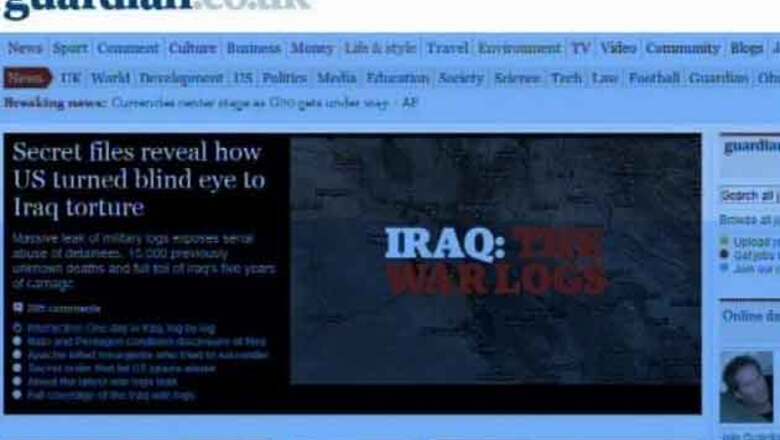
views
Washington: WikiLeaks released nearly 400,000 classified US files on the Iraq war on Friday, some detailing gruesome cases of prisoner abuse by Iraqi forces that the US military knew about but failed to investigate.
The Pentagon decried the website's publication of the secret reports, the largest security breach of its kind in US military history, far surpassing the group's dump of more than 70,000 Afghan war files in July.
US officials said the leak endangered US troops and had identified some 300 Iraqi collaborators who were now at risk.
WikiLeaks' founder Julian Assange said the documents showed evidence of war crimes, but the Pentagon dismissed the files as 'ground-level' field reports from a well-chronicled war with no big surprises.
"We deplore WikiLeaks for inducing individuals to break the law, leak classified documents and then cavalierly share that secret information with the world," Geoff Morrell, Pentagon press secretary, said.
The Iraq war files touched on other themes, including well-known US concerns about Iranian training and support for Iraqi militias. The documents, which spanned 2003 to 2009, also detailed 66,081 civilian deaths in the Iraqi conflict, WikiLeaks said.
Assange told Al Jazeera television that the documents had provided enough material for 40 wrongful killing lawsuits.
"There are reports of civilians being indiscriminately killed at checkpoints ... of Iraqi detainees being tortured by coalition forces, and of US soldiers blowing up entire civilian buildings because of one suspected insurgent on the roof," WikiLeaks said in a statement.
Although the Iraq conflict has faded from US public debate in recent years, the document dump threatens to revive memories of some of the most trying times in the war, including the Abu Ghraib prisoner abuse scandal.
Cracked Ribs
Media organisations given advanced access to the massive database, 10 weeks in one case, broadly concluded that the documents showed that US forces had effectively turned a blind eye to torture and abuse of prisoners by Iraqi forces.
In one case, an Iraqi policeman shot a detainee in the leg. The suspect was whipped with a rod and hose across his back, cracking ribs, caused multiple lacerations and welts.
"The outcome: 'No further investigation'," the Guardian wrote.
The documents also cited cases of rape and murder, including a video-taped execution of a detainee by Iraqi soldiers.



















Comments
0 comment